

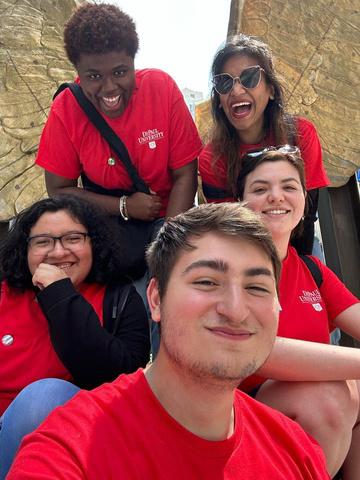

THE SOCIAL TRANSFORMATION RESEARCH COLLABORATIVE: THE YEAR IN REVIEW


1

2
2023 Summer Institute for New Students
T A B L E O F C O N T E N T S
05
STRC PEOPLE
2022-23 SUMMER INSTITUTE COHORT
07
STRC CO-DIRECTORS
BILL JOHNSON GONZÁLEZ
JULIE MOODY-FREEMAN
08
STRC COORDINATOR
ALEJANDRA DELGADILLO
09
15
STRC RESEARCH HIGHLIGHTS
RESEARCH FELLOWS
PROFESSIONAL DEVELOPMENT FELLOWS
POSTDOCTORAL FELLOWS
BOOK INSIDER
LOURDES TORRES: SPANISH IN CHICAGO
3
28 STRC 2023 UNDERGRADUATE RESEARCH FELLOWSHIP COINSTRUCTORS
30
35
STRC SUMMER INSTITUTE FOR NEW STUDENTS
SUMMER INSTITUTE PEER LEADERS
SUMMER INSTITUTE PEER MENTORS
38
STRC EVENT RECAPS
41
STRC 2023 SYMPOSIUM
CONTACT US
4
STRC
Dr. Billy Johnson González STRC Co-Director
Dr. Julie Moody-Freeman STRC Co-Director
Dr. Margaret Storey
Steering Committee Member, Dean’s Office, College of Liberal Arts and Social Sciences
Dr. Li Jin
Steering Committee Member
Dr. Amor Kohli Steering Committee Member
Dr. Carolina Sternberg Steering Committee Member
Dr. Lourdes Torres
Steering Committee Member, 2022 STRC Professional Development Fellow
Dr. Delia Cosentino
Interim Steering Committee Member
Dr. Chernoh Sesay, Jr.
Interim Steering Committee Member, 2022-2023 STRC Faculty Research Fellow, 2024 STRC Undergraduate Research Fellowship Instructor
Alejandra Delgadillo Coordinator
Dr. Anne Mitchell
Former Steering Committee Member
Dr. Susana Martínez
2022-2023 STRC Faculty Research Fellow
Dr. Lori Pierce
2022 STRC Professional Development Fellow
Dr. Maria Ferrera
2023 STRC Professional Development Fellow
Dr. Jacqui Lazú
2023 STRC Professional Development Fellow
Dr. Rocío Ferreira
2023-2024 STRC Faculty Research Fellow
Dr. Juan Mora Torres
2022 Summer Institute Co-Lead, 2023-2024 STRC Faculty Research Fellow
Dr. Mónica Reyes
2022 Summer Institute Co-Lead
Dr. Michele Morano
2023 Summer Institute Co-Lead
Dr. Tara Betts
2023 Summer Institute Co-Lead
Dr. Lisa Poirier
2023 STRC Undergraduate Research Fellowship Co-Instructor
Dr. Ashley Stone
2023 STRC Undergraduate Research Fellowship Co-Instructor
Dr. Meloddye Carpio Ríos
STRC Postdoctoral Fellow, Department of Latin American and Latino Studies
Dr. Saturnino Rodríguez
2022-2023 STRC Postdoctoral Fellow, Department of African and Black Diaspora Studies
Dr. Taurean Webb
2023-2024 STRC Postdoctoral Fellow, Department of African and Black Diaspora Studies
Shameem Razack
2022 Graduate Student Fellow
Paul Mireles
2022 Graduate Student Fellow
Keish Lozano
2022 Graduate Student Fellow
Rumi Rivera
2022 Graduate Student Fellow
Shannan Moore
2023 Graduate Student Fellow
Laura Carvajal
2023 Graduate Student Fellow
Gabriela Córdova
2023 Undergraduate Student Fellow
Jael Davis
2023 Undergraduate Student Fellow
Laszlo Katona
2023 Undergraduate Student Fellow
Krystal Morgan
2023 Undergraduate Student Fellow
Lila Nambo
2023 Undergraduate Student Fellow
Samara Smith
2023 Undergraduate Student Fellow, STRC Student Assistant
Mya Pierson
STRC Student Assistant (graduated)
5
PEOPLE
Gerardo Ávila
Jacinda Akins
Kyli Bryant
Amy Cano
Michelle Cisneros
Jess Correa, 2023 Summer Institute Peer Mentor
David Crum
Allyson Bradley
Dania Soriano
Diamond Burks
Elijah Edwards
Fantazia Torres-Cain
Gael Delgadillo
Giselle Guerrero
2022 Summer Institute Cohort
Marjorie Ortega
Isabella Reyes
Vincent Rinella, 2023 Summer Institute Peer Mentor
Anjélica Rodríguez
Morgan Unold
Iman Williams
Yù Yù Zander
2023 Summer Institute Cohort
Gloria Hernández
Guadalupe Osorio
Henry Koplin
Jada Marshall
Karen Razal
Karmen Johnson
Marc Morales
Amanda Matthews
2022 Summer Institute Peer Leader
Amy Acosta
2022 Summer Institute Peer Leader
Ahtziri Alviso
2022 Summer Institute Overnight Peer Leader
Serenity de Oca
2022 Summer Institute Overnight Peer Leader
Brielle Buford
2022 Summer Institute Peer Mentor
Ayyub Jose
2022 Summer Institute Peer Mentor
Lara Dimassi
Jahzara Dunn
Angela Hernández
Aaron Herrera
Socrates Hwang
Jaricha Klinkner
Maryam Naveed
Nicole Silva
Nina Bardin
Ope Dina
Ryan Channel
Sara Elagha
Taylor Simon
Rodrigo Melgarejo
2022 Summer Institute Peer Mentor
Shafeeqa Aiman Syeda
2023 Summer Institute Daytime Peer Leader
Grecia Gabriela García Camacho
2023 Summer Institute Overnight Peer Leader
Samira Morris
2023 Summer Institute Peer Mentor
Victoria Alejandra Vega
STRC Graduate Assistant to 2022-2023 Research Fellow
Susana Martínez
Claudia Cisneros Mendez
STRC Graduate Assistant to 2023-2024 Research Fellow
Rocío Ferreira
6
STRC CO-DIRECTORS
Julie E. Moody-Freeman is the Director of the Center for Black Diaspora, Co-Director of the Social Transformation Research Collaborative, and an Associate Professor in the Department of African and Black Diaspora Studies at DePaul University.
She is the co-editor of The Black Imagination, Science Fiction, and the Speculative and The Black Imagination: Science Fiction, Futurism, and the Speculative. Her scholarly essays on Belizean writer Zee Edgell have been published in African Identities, Macomeré, Canadian Women Studies/les cahiers de la femme, and Seeking the Self-Encountering the Other: Diasporic Narrative and the Ethics of Representation Her publications on African American Romance have appeared in Romance Fiction and American Culture, The Research Companion to Popular Romance Fiction, the Journal for Popular Romance Studies, and in Black Love Matters: Real Talk on Romance, Being Seen, and Happily Ever Afters
She is also the creator and host of the Black Romance Podcast, which is building an oral history on Black Romance writers.

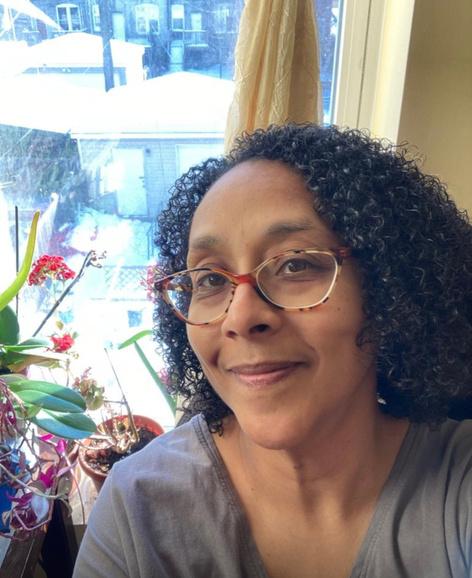
Bill Johnson González is an Associate Professor in the English Department, Director of the Center for Latino Research, and Co-Director of the Social Transformation Research Collaborative at DePaul University. He is also Editor in Chief of Diálogo, a peer reviewed journal of Latinx and Latin American Studies.
His teaching and research interests include multilingualism in U S Latinx literature, Latinx film, and contemporary queer cultural production He has published work on multilingualism in differences: a feminist journal, and on queer Chicano film in GLQ He is the co-editor of Passing Lines: Sexuality and Immigration (Harvard UP, 2005) as well as of The Surprise of Otherness: A Barbara Johnson Reader (Duke UP, 2014), and is currently completing a translation of Aventuras de un bracero, the only novel known to have been written by a bracero.
7
STRC COORDINATOR
Alejandra Delgadillo is the Coordinator of the Social Transformation Research Collaborative She received her associate degree from City Colleges of Chicago before transferring to DePaul, where she earned a bachelor's degree in Latin American and Latino Studies with a minor in Spanish Translation and is pursuing a master's degree in Spanish with a certificate in Translation and Interpreting
Her interests in Latin American and diasporic history and literature, translation, and linguistics have been shaped by her upbringing in Mexico and her experience as an English Language Learner student in the United States She has worked with DePaul's Translators and Interpreters Corps (TIC), where she has volunteered as simultaneous interpreter for the YMCA in UrbanaChampaign and has translated documents for Cook County and the University of Chicago, among other institutions and organizations


8
STRC RESEARCH HIGHLIGHTS
FACULTY RESEARCH FELLOWS
PROFESSIONAL DEVELOPMENT FELLOWS
POSTDOCTORAL FELLOWS
UNDERGRADUATE RESEARCH FELLOWS
STRC 2022 - 2023 RESEARCH FELLOWS
DR. CHERNOH SESAY, JR.
2022-2023 FACULTY RESEARCH FELLOW
Associate Professor, Religious Studies
My Social Transformation Research Collaborative Faculty Research Fellowship provided me invaluable time to prepare for submission to an editor, my book manuscript, Black Boston and the Making of African-American Freemasonry: Leadership, Religion, and Fraternalism in Early America In partial consequence of my writing, this past autumn, from November 16 to 18, 2023, I was invited to present my work at a conference, titled “The Declaration of Independence at 250.” The Department of History at the University of New Hampshire and the Robert H. Smith International Center for Jefferson Studies in Charlottesville, Virginia, hosted, at UNH, a conference to consider the upcoming two hundred and fiftieth anniversary of the United States’ Declaration of Independence. The eminent historians, Eliga Gould (UNH) and Frank Cogliano (Monticello) organized and presided over the two-day conference Of course, a conference organized around the Declaration demonstrates how this foundational document in American history has become hallowed, perhaps even sacred. However, the conference included a range of papers that, in different ways, took critical approaches to the Declaration with some emphasizing some of its overlooked and negative consequences relative to settler colonialism My presentation, titled “Freemasonry, American Independence, and the Transatlantic Dimensions of Black Patriotism,” asked the audience to consider a kind of Black Declaration of Independence and to think critically about current narratives stressing Black allegiance to American nationalism Three years before the thirteen British colonies declared their break with the English Crown, in early 1773, a group of Black abolitionists, probably writing with the support of sympathetic White leaders, asked for support to emigrate to Africa This request was its own declaration that some Africans and American Africans wanted to fashion sovereignty outside of English and White dominion Amongst these Black writers were men that, in either 1775 or 1776, formed the first all-Black lodge of Freemasons. The development of African American Freemasonry just before and after the Declaration of

Independence forces us to consider patriotism less as a position of principle and more as a political strategy in answer to questions of settlement and political belonging.
This argument is a central feature of my current book project, that Black Freemasonry was a critical feature of early Black abolition Freemasonry provided an institution and an ideology that reflected late eighteenth and early nineteenthcentury Black abolitionists’ interlocked concerns with transnationalism, sovereignty and local settlement Some in the audience were hearing for the first time that Black Freemasons played critical political roles during the American Revolution. There have been relatively few historical examinations that sustain an analysis of the relationship between Black abolitionists, Freemasonry, and a broader Black community In addition to the positive reception of my brief presentation, the conference allowed me to make some great connections, including a brief but pleasant conversation with none other than Professor Annette Gordon-Reed (Harvard University), law professor, historian, Pulitzer Prize and National Book Award winner, MacArthur Fellowship awardee, and recipient of many other prestigious accolades. It turns out that, in partial consequence of my participation at this conference, I have been invited to present more of my book project at an history conference taking place at the Robert H Smith International Center for Jefferson Studies in October of 2024 Without the STRC Research Fellowship, I would not have had the time for nearing completion of my manuscript nor would I, I don’t think, have made as impactful a presentation as I did last November.
10
STRC 2022 - 2023 RESEARCH FELLOWS
DR. SUSANA MARTÍNEZ
2022-2023 FACULTY RESEARCH FELLOW
Associate Professor, Modern Languages Director, Peace, Justice & Conflict Studies
During the 2022-2023 academic year, I was fortunate to receive a Social Transformation Research Collaborative Fellowship Thanks to this opportunity, I was able to focus on my book project, which examines the representation of the Central American child migrant journey in young adult literature. I find my work as an associate professor of Spanish and director of the Peace, Justice and Conflict Studies Program particularly fulfilling because my teaching, scholarship and service commitments have become deeply interconnected with my community ties to immigrant justice activism
These different components of my work best come together when I work with students to break down the borders between social justice work inside and outside the classroom As a long-time volunteer with an interfaith organization that does immigrant advocacy work in Chicago, before the pandemic I was able to visit unaccompanied children in two shelters, as they waited to be reunited with family or sponsors Although our role as volunteers was to provide arts and crafts activities for the children, as a community we advocated for abolishing ICE and ending the separation and jailing of immigrant families. Because I knew of the needs within the shelters, I was able to organize a stuffed animal and book drive with the university’s Women’s Center, where many students and colleagues dropped off donations
To deepen students’ understanding of the root causes of migration, I have led several study abroad trips to Mexico and El Salvador To prepare for our trips abroad, I often conduct classes in the Special Collection archives at the university library I work with the archivists to have students examine documents dating back to El Salvador’s civil war and the life of Archbishop Oscar Romero who advocated for the poor During my most recent trip with students in December 2019, we
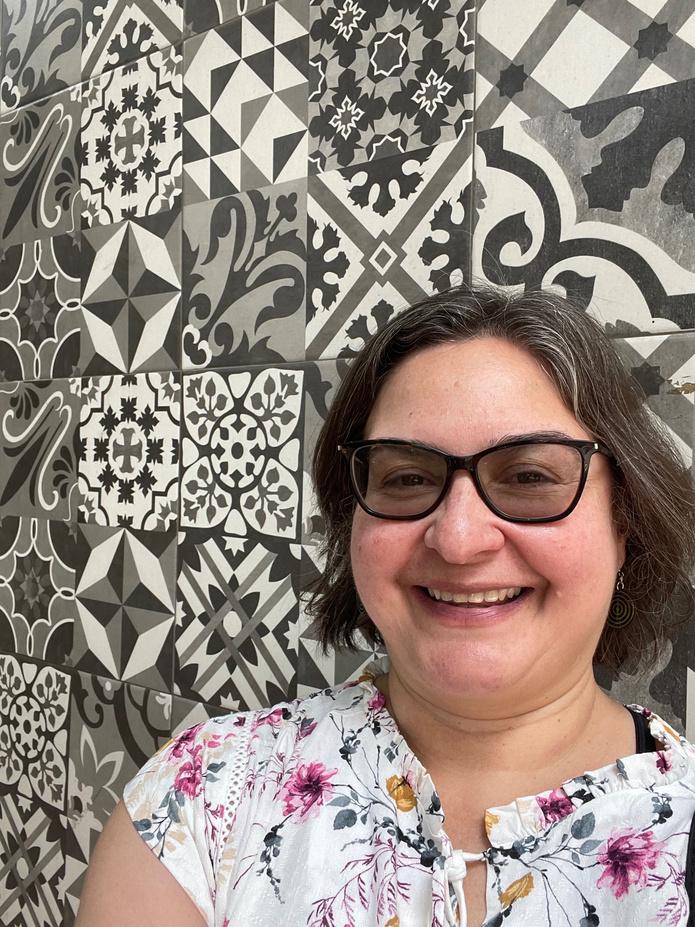
visited his home and the church where Romero was assassinated while saying mass in 1980 This work resulted in the pedagogical publication, “Learning about Archbishop Oscar Romero in the Special Collections Archives,” in Teaching Central American Literature in a Global Context edited by Gloria Elizabeth Chacón and Mónica Albizúrez Gil (2022) In my view, creating spaces for

11
structural violence and the immigrant justice work that is still so necessary today

A valuable lesson that my students and I have learned is that we are not powerless. We can serve as witnesses during these uncertain times while growing in awareness and raising our voices in protest when our leaders endorse violence over s students and scholars, we can choose to th the most vulnerable, lifting up their nd dignity.


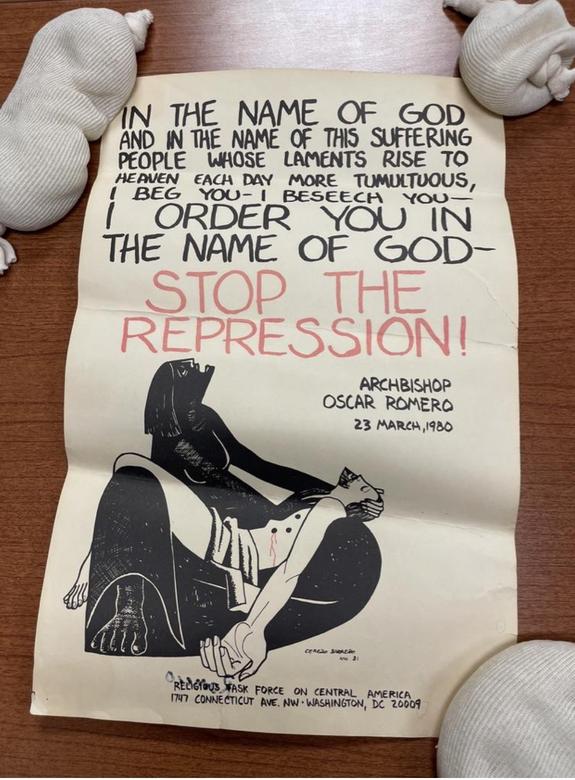
12
2023 Summer Institute Taylor Simon
The time that I spent attending the STRC Summer Institute was absolutely phenomenal
I was born and raised in Chicago and still have so much to learn here A particularly impactfu event during the week-long stay was the walking tour through Paseo Boricua with Eduardo Arocho. In Chicago, you go outside and could be looking at three distinct areas at once They're all completely different; culture economic status, the buildings themselves access to public transport Neighborhoods so rapidly gentrify and change that preservation isn't something you necessarily become accustomed to here This wasn't the case with Paseo Boricua. During the walking tour Eduardo shocked me with how intertwined he was with the community. Every time we stopped, he would get a hug, a handshake, and big smile after big smile He told us about the affordable community housing that was being built to maintain the neighborhood Steel pipes make up the shape of the Puerto Rican flag and outline the borders of the district They are now historical landmarks of Chicago, and cannot be removed. He taught us about how integral the flag is to the history and protection of the culture. Taking in this space was inspiring, to say the least. It was a reminder to me that through knowledge, preservation, and community, we are able to motivate and create so much happiness

This was just one of the fulfilling experiences that I got to have at the STRC, and I'm so thankful to have been a participant!
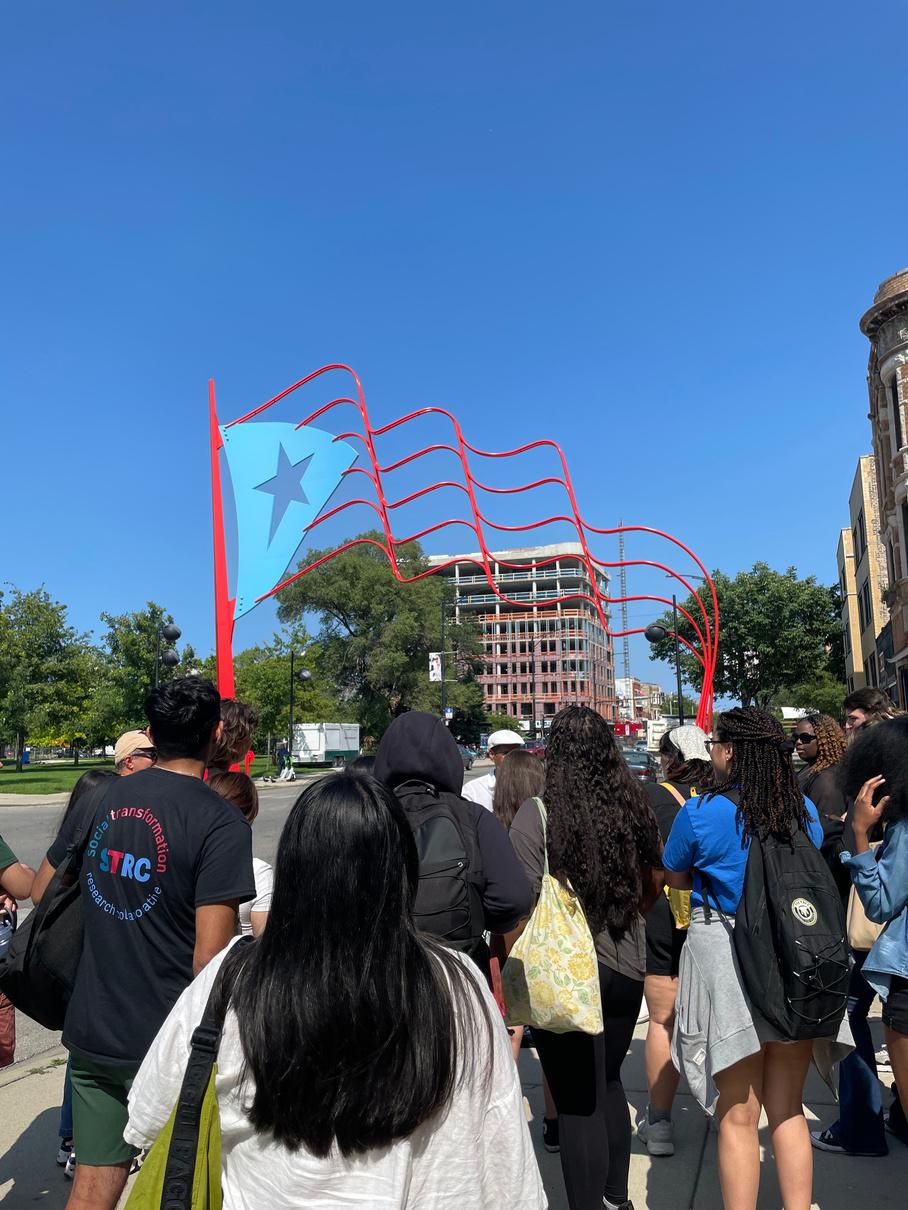
13
STRC 2022
PROFESSIONAL DEVELOPMENT
FELLOWS
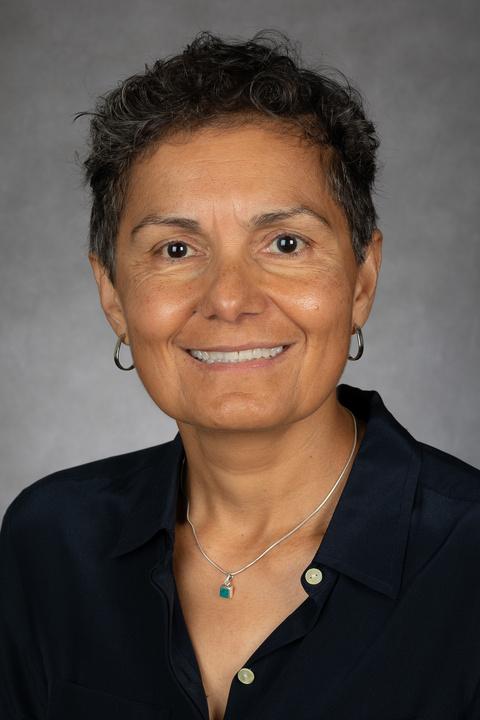

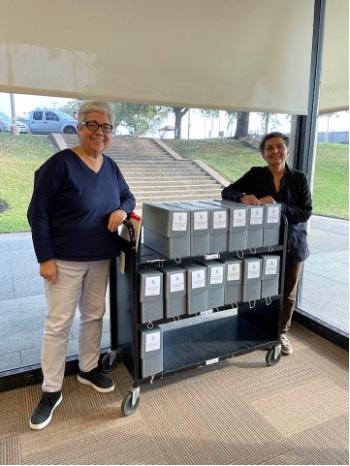
DR. LOURDES TORRES STEERING COMMITTEE MEMBER 2022 STRC PROFESSIONAL DEVELOPMENT FELLOW
Vincent DePaul Professor, Latin American and Latino Studies / Director, Critical Ethnic Studies
A Trip to the Archives
Archival research is a lot of fun! I am grateful for the STRC Professional Development Fellowship award which allowed me to engage in archival research for my project, “Toward a History of LLEGÓ.” LLEGÓ, was a national Latino/a/x lesbian, gay, bisexual & transgender organization (19872004) that mobilized Latinx organizations to promote a national Latino/a LGBT agenda. I am working with my co-author, Leti Gomez, one of LLEGÓ’s founders, to document LLEGÓ’s rich history
Leti and I recently spent a week digging through LLEGÓ’s organizational records housed at the University of Texas at Austin. The LLEGÓ archive collection contains correspondence, newsletters and printed material, meeting agendas and minutes, reports, financial records, and photographs organized in 71 boxes of materials Leti and I immersed ourselves in the archives for one week, reading and photocopying historical documents that will inform our project. We were particularly gratified to find materials on LLEGÓ’s cutting-edge programs such as TATA – Technical Assistance and Training in AIDS project, Transgender Leadership Summit, the internationally focused CIPCEN (Cooperativa Internacional de Prevención de VIH/SIDA en Centroamerica Norte) and BASTA, a domestic violence prevention and outreach program We also found a rich body of materials related to LLEGÓ’s annual Encuentro conferences, as well as newsletters and media reports that track the life of the organization. It was exciting to find and read though all these fascinating documents. Now comes the hard work of shaping all this material into a compelling narrative that tells LLEGÓ’s story
14
BOOK INSIDER
Lourdes Torres, PhD, is a Vincent DePaul Professor of Latin American and Latino Studies, Director of the Critical Ethnic Studies Program, and 2022 STRC Professional Development Fellow. She teaches topics on sociolinguistics, Spanish in the U.S., and Queer Latinx Literature.
We interviewed Dr Torres about her recently published book, Spanish in Chicago (coauthored with Dr. Kim Potowski), the first book-length study of its kind where they explore Spanish in Chicago, where Mexican Spanish, Puerto Rican Spanish, and English have been spoken for decades.
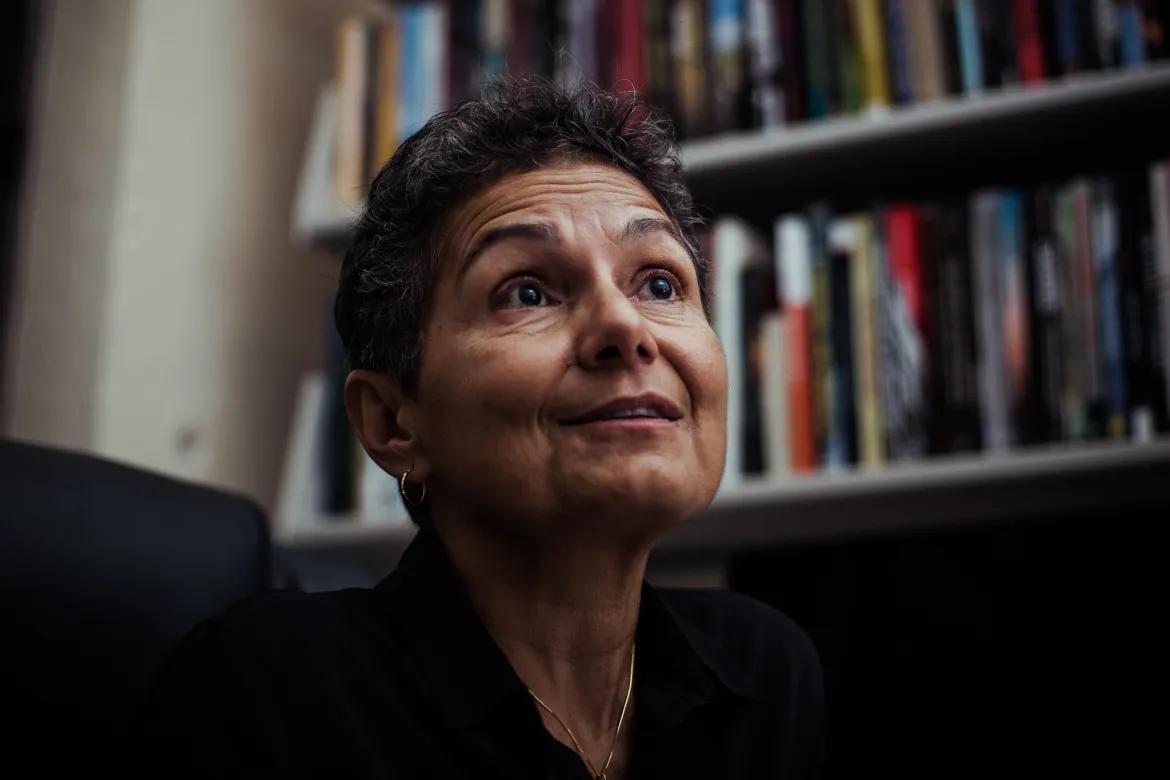
What motivated you to research Spanish in Chicago and eventually write a book about it?
As a sociolinguist I am always curious about language evolution and change and particularly about how Latinx bilinguals use Spanish and English to make meaning. Chicago is an interesting site to study because Latino populations of different nationalities, particularly Mexicans and Puerto Ricans have coexisted here for decades, so it is a great context to study dialect contact One question that drove the research was: since the Spanish varieties of Mexicans and Puerto Ricans have co-existed over decades, does this language contact cause the Spanish varieties to become more similar over time
How does this book fit into the larger body of work in your career?
Since the data for my research is real world language use, I study the language of the people in my community When I was in New York, I wrote about Puerto Rican Spanish in New York. Once I moved to Chicago (over 20 years ago), I became interested in language dynamics among Latinos in Chicago.
15
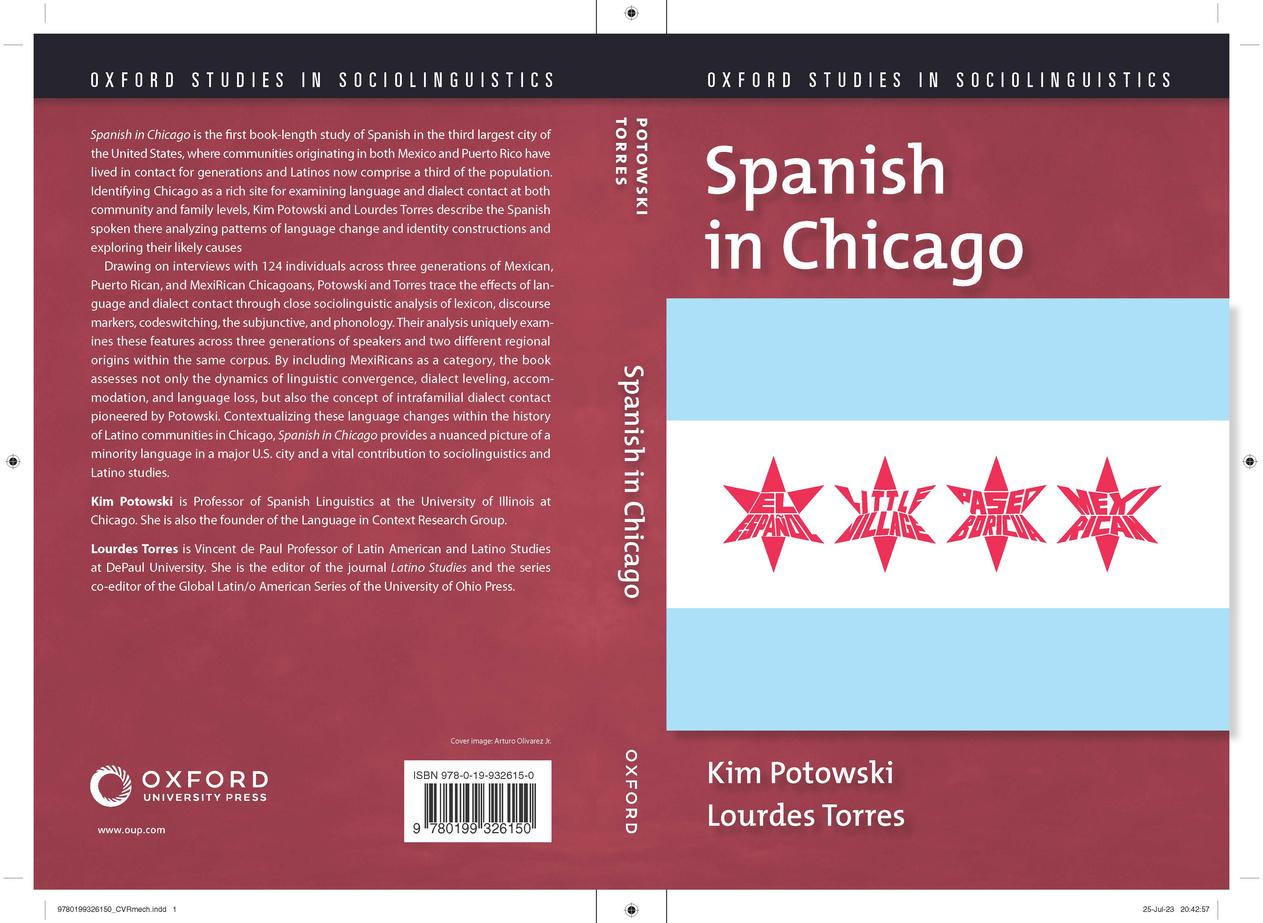
What has been the most rewarding aspect of having your book published?

I am glad that a book now exists that tells the story of the Spanish language in our city. Such books exist for New York and Los Angeles, so I am glad we have addressed this gap in the literature.
How was the process of co-authoring this book with Kim Potowski? What challenges did you face while writing this book and how did you overcome them?
Since Kim is a good friend, it was wonderful to work with her. We also had a great team of undergraduate and graduate students from DePaul and UIC who we trained to conduct interviews with us This was a team effort In terms of writing, Kim and I took the lead on different chapters and the co-writer would edit and add to the efforts of the first writer Since Kim and I were engaged in numerous projects at the same time as we were writing this book, it was challenging to find the time and space to complete the project, but we stuck to it and finally finished the project
Who is this book for?
This book is for folks who are interested in sociolinguistics, Spanish in the US, and language contact. It is also intended for people interested in how the Mexican, Puerto Rican, and MexiRican Spanish varieties in Chicago have evolved over the generations.
What do you hope people take away from reading Spanish in Chicago?
My biggest hope is that people realize that Spanish is an important resource that is worth preserving Not only is it an important part of our heritage as Latinxs but it is also a source of great creativity and vitality Since the US is such a hostile environment for the survival of languages other than English, it takes a herculean effort to ensure that other languages are passed down from generation to generation I hope the book provides readers with guidance so that we can all work toward the maintenance of Spanish in Chicago for decades to come
Scan the QR code to read more
16
STRC 2022 PROFESSIONAL DEVELOPMENT FELLOWS
DR. LORI PIERCE
2022 PROFESSIONAL DEVELOPMENT FELLOW
Associate Professor of African and Black Diaspora Studies / Global Asian Studies
The goal of my fellowship project was to explore two subjects that illustrate the legacy of race in the age of genetics: the use of DNA in forensic analysis in the criminal justice system and direct-to-consumer (DTC) DNA ancestry testing. In each case, DNA has been used to support liberatory projects for African Americans
I got interested in DTC ancestry testing because it just kept coming up in classes. One minute we’re dismantling racial ideologies and categories and firmly agreeing that race is socially constructed The next minute, students are talking about the test that showed they were 12% Asian or 45% Irish Why are these tests so seductive? They’re advertised as a means to find out who you really are, which is about as explicit an affirmation of racial essentialism as you’re likely to hear But the flip side of this is that DTC ancestry testing has the power to give diasporic communities a sense of kinship and connection For people of African descent, finding ancestors has always been elusive, so ancestry testing may have the power to fill in some gaps. Imagine if the Freedman’s Bureau had access to DNA testing to help reunite the families of the formerly enslaved
The use of genetic testing has the potential to surmount an obstacle put in place by enslavers who separated families in order to maintain control over the enslaved The same technology has been used to weave together disparate

strands of the diaspora; people of African descent in the Americas, Europe, and the African continent can now see each other as actual rather than fictive kin. Similarly, advances in the science and technology of genetic testing have freed hundreds of people who were wrongly imprisoned The technology is imperfect, however, and judges, attorneys and juries need more education about the ability of forensic testing to convict or acquit.
It’s always fun to immerse yourself in a new topic
Since my goal was to gather resources I could use in a class, I didn’t try to force myself to learn the basic science There’s a lot of good science journalism and writing for non-professionals, so I relied on those sources to coach me through the basics. Just enough to be able to lead a discussion and correct misconceptions
As I move forward, I will continue to engage in these discussions and advocate for greater awareness surrounding the ways in which genetics intersect with race, justice, and identity.
17
STRC 2023 - 2024 RESEARCH FELLOWS
DR. ROCÍO FERREIRA
2023 - 2024 FACULTY RESEARCH FELLOW
Associate Professor of Modern Languages Department Chair of Women's and Gender Studies
During my STRC Fellowship I will be working on my book project, Women Shoot: Poetics of Political Violence in Contemporary Peruvian Culture The book traces the diverse ways in which contemporary Peruvian culture has resisted silencing, oblivion, and indifference, and has constructed alternative approaches to the understanding of traumatic realities through innovative reflections on the transmission of social memory through women’s gazes Drawing from Benjamin, Agamben, Caruth, Richard, Sarlo, Butler, Quijano and other theorists who work on trauma, memory, gender and decolonization, this project analyses the intrinsic relationship between postdictatorial mournful memory work in cultural representations of the Peruvian Internal Armed Conflict (PIAC) and allegory as the trope that voices mourning. By identifying and filling in some critical shortcomings of existing research, this project offers an interdisciplinary approach that can illuminate and improve our understanding of the PIAC
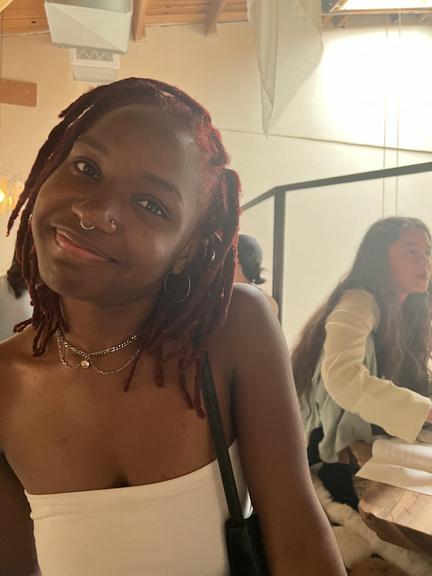

The book aims to transmit social knowledge and memory, to preserve mournful memory and provide access to the heretofore unknown cultural responses to politics produced by women writers, playwrights, and film directors Moreover, it strengthens the relevance of the humanities to the understanding of recent Peruvian, Amazonian and Andean histories and cultures, thus illuminating cultural resiliency, restoration, and healing.
SAMARA SMITH
2023 UNDERGRADUATE RESEARCH FELLOW STRC STUDENT ASSISTANT
e summer of 2023, I was able to participate in the STRC Undergraduate Research Fellowship. I ed the fellowship expecting to hone my skills in research, analysis, and presentation I did not ct to also be expanded by my engagement with the work. My project was a visual analysis of Beyoncé’s visual album, Lemonade, and I didn’t know initially what I wanted to say or how to make it matter. But with the support of my peers and the guidance of professors Lisa Porier and Ashley Stone, I was able to create something that did not only matter, but shifted something inside of me. As a Black scholar aspiring to do more work in academia, I realized that this work is not just about exploring your interest–which it can be, too, but the real weight is the task of the Black scholar, activist, writer, reader, teacher to carve out spaces for themselves and their community to feel seen and heard. It was through the STRC Undergraduate Research Fellowship that I was able to participate in this larger effort of meaning-making within the Humanities.
18
STRC 2023 - 2024 RESEARCH FELLOWS
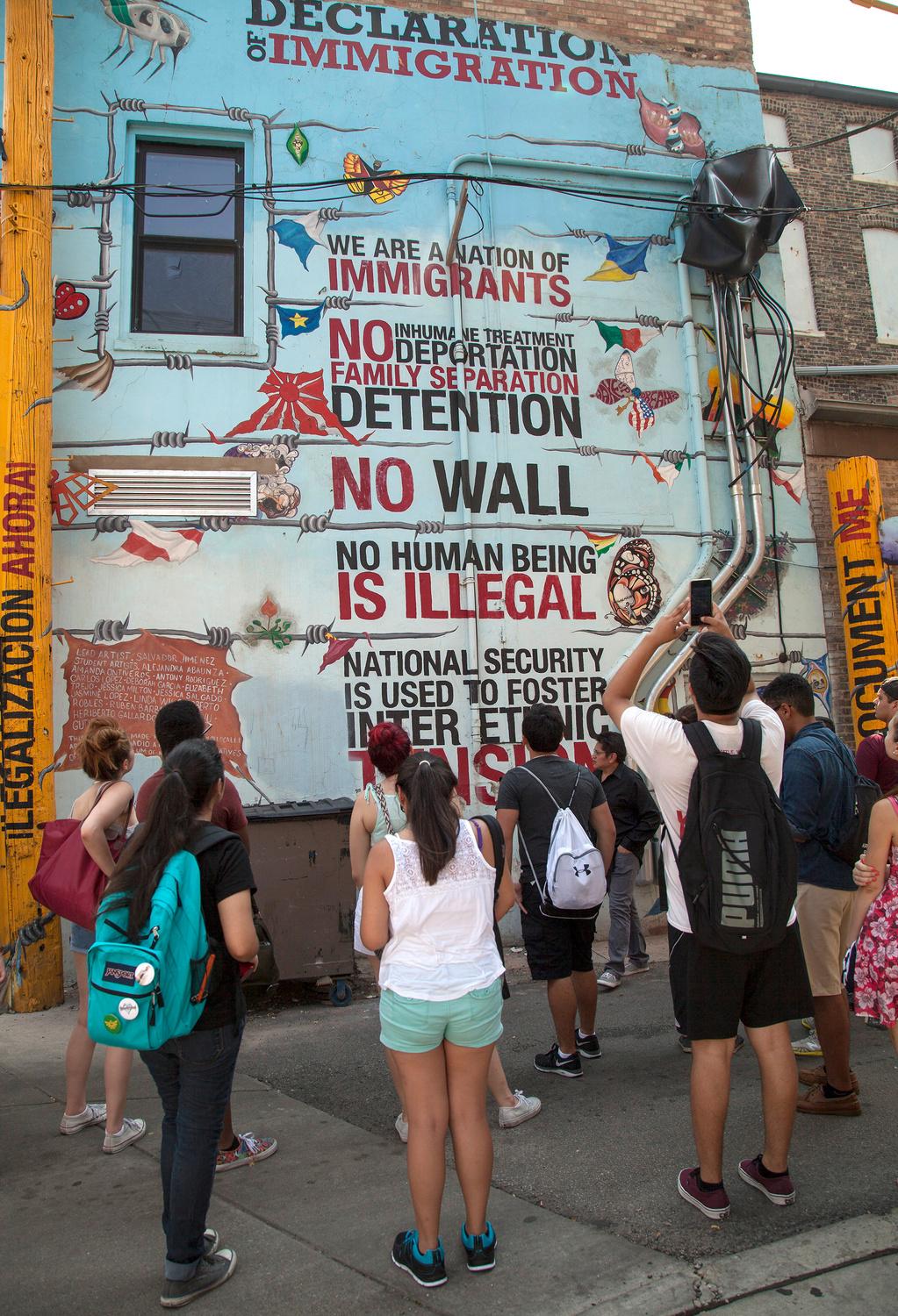
19
DR. JUAN MORA TORRES
2023 - 2024 FACULTY RESEARCH FELLOW 2022 STRC SUMMER INSTITUTE FACULTY
Associate Professor of History
I am an activist who became a scholar and a historian of Latin America who has crossed into American history, focusing on the histories of Latinos and Chicanos With that in mind, my book manuscript, Mexicans in Babylon: Barrio Making in Chicago’s West Side, 1917-1983, aims at two scholarly and political targets. First, it challenges the dominant black-white binary framework by placing Mexicans and Latinos at the center of the ethnic transformation of Chicago's landscape from 1945 to 1983, when the city changed from 86% white to an African American and Latino majority. It highlights how Latinos - even in the face of racism, segregation, classism, and xenophobiacreated resilient communities to transform the city Second, it places Chicago’s unique history of racism and anti-racism within a broader context by examining the complex relationship between Black and Brown communities on the West Side. I explore the issues dividing both communities and the ones that brought them together, such as school and police reform, affirmative action in employment, and electoral representation, such as the Black and Brown coalition that led to the election of Harold Washington in 1983.
Besides being an awardee of the 2023 - 2024 STRC Faculty Fellowship, which will allow me to work on my book manuscript, my relationship with the STRC includes co-teaching with Dr. Monica Reyes, the “Influencers for Racial and Social Justice” course for the 2022 Summer Institute. The course examined historical “influencers” like Lucy Gonzalez de Parson, Ida B Wells, Young Lords, and the Mexican muralists to the more contemporary working in Black, Brown, and Asian American communities I blended into the course my experience of leading walking tours of
neighborhoods in Chicago most impacted by poverty, gentrification, segregation, and redlining For instance, the aim of our visit to Black North Lawndale and Mexican South Lawndale (Little Village) was to introduce students to the meaning of racial boundaries and multi-racial coalitions and to engage them to use Chicago as a roadmap for learning outside of the classroom and to expand their intellectual curiosity by encouraging them to enroll in African and Black Diaspora, Global Asian, and Latin American and Latinx Studies courses
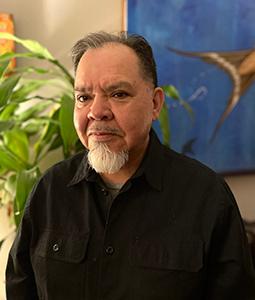
20
STRC 2023 PROFESSIONAL DEVELOPMENT FELLOWS
DR. JACQUELINE LAZÚ
2023 PROFESSIONAL DEVELOPMENT FELLOW
Associate Professor/Vincent De Paul Professor Modern Languages
As an STRC Fellow, I've collaborated on transformative projects centered on the Chicago Young Lords Organization (YLO). Working with original YLO members, Center for Latino Research colleagues, and the library’s Special Collections Department, we established the Young Lords Collection over several decades, which heavily informs my current book projects and public history initiatives
In the last year, I have been able to develop my skills in archival management. I have had many opportunities to collaborate with experts in our library, artists and curators in the community and have learned a lot from them I wanted to delve deeper into those skills so I could offer more to these partnerships and imagine new ways to present history to the public. As a direct result of my work in collection development, in 2023 I curated the historical exhibit "Encendidas: Women of the Chicago Young Lords 1965-Present," which highlights the pivotal role women have played in the movement
This work builds on my career-long research on the YLO and the origins of the movement in Chicago In the last few years, I have been looking specifically at the role that DePaul University played in the evolution of the civil rights group and the Puerto Rican barrio that once existed in Lincoln Park. Both the Young Lords and the Puerto Rican community of Chicago have left an indelible mark on our institutional development and history. For decades since the transition of the Young Lords gang into a political organization, DePaul students, faculty, and staff have been directly engaged with the organization on the issues that most concerned them: gentrification and community displacement, colonialism and coloniality, self-determination for Puerto Ricans and all economically disadvantaged individuals and communities, and police brutality There were

many other encounters since the late 1960s, although the most notable was the takeover of the Stone Building in May of 1968, which at the time was the administration building of the McCormick Seminary The building, which the Young Lords renamed “The Manuel Ramos Memorial Building”, was eventually sold to DePaul in the late 1970s Nevertheless, the Stone Building, now the School of Music building at DePaul, is the last standing structure that marks in any way the history of the movement’s origins in Chicago. One of the most significant outcomes of this fellowship has been, with the support of President Robert Manuel, to formally memorialize this legacy by placing a historical marker in the form of a bronze plaque on the building’s façade. It is scheduled to be unveiled in a public event on May 14, 2024. These efforts are part of a multi-year plan to develop programming on the Young Lords' Lincoln Park origins
There is still so much more for us to learn about the Young Lords Our responsibility is to create more opportunities to honor and learn about what happened in Lincoln Park in the late 1960s, and to understand the protracted struggle, the ongoing conditions of colonialism, poverty, and displacement in Puerto Rico and in the diaspora
219 1
here in Chicago. The struggle of the Young Lords back then was motivated by circumstances that still exist for people of color and economically disadvantaged individuals and communities in Chicago We must honor that history, and we must honor our core values and the mission of the university by actively seeking more ways to confront and repair historical injustices.
I hope that we can all show up and take pride in the programs we will have available throughout the year here at DePaul and in the larger community to educate people about the Young Lords and the long history of resistance in Latinx Chicago. As the Latinx student population continues to grow at DePaul and we continue to build on our commitment to diversity, this really must be understood as a cultural shift for our university
Learn more about Dr. Lazú’s work:
DePaul Newsline: “Revealing history: DePaul honors Young Lords’ legacy in Lincoln Park”
GABRIELA CÓRDOV
2023 STRC UNDERGRADU RESEARCH FELLOW
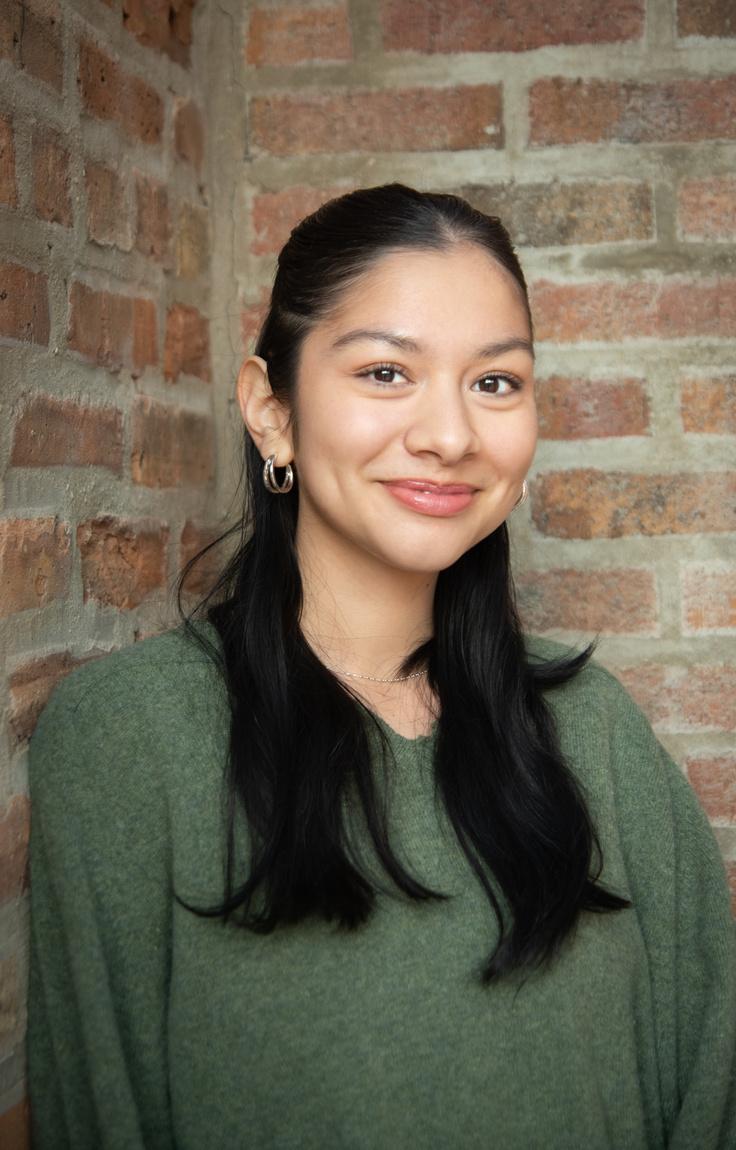
My experience as an STRC Undergraduate Research Fellow served me so much in coming into my shoes as a researcher. When I first started this journey this past summer, I had never conducted a research project on my own before. At first, this was scary. Other than a very obscure grasp on what I wanted my project to be based on, I was unaware of archival visits, how to conduct a comprehensive literature review, and which methods would work best to support and strengthen my research findings. Yet, I soon found that all of this did not constitute my capacity as a researcher.
In those first few weeks, thanks to the help of my mentors Dr. Ashley Stone and Dr. Lisa Poirier, I was able to gain a strong understanding of different research approaches that would help me with my project. The class they co-taught was incredibly instructive on tools I could use and I felt our small cohort classroom become a space where we could talk openly about our progress, challenges, and places for improvement I remember my favorite day was our trip to the Newberry Library. As an English and Education Major, it was great to get a run down on their collections and archives! This I felt prepared me to get the courage to then later conduct my own site visits at the Gerber/Hart Library and Archives, The Center of Latino Research, and DePaul’s own Special Collections
Lincoln Park Walking Tour
By the time of the symposium, I felt proud of what I was able to achieve and presented my findings about Latina women advocacy in Chicago focusing on Amigas Latinas and Mujeres Latinas en Acción. Presenting made me confident in being able to articulate what I was seeking to share with my findings Expressing myself in both English and Spanish, I felt my message about the essential visibility of Latina women advocates in the social justice space was underlined and with the feedback I received I felt I made a difference with the work I put forth. Special thanks to Professor Bill Johnson González for all his invaluable guidance and support throughout my project!
22
STRC 2023 PROFESSIONAL DEVELOPMENT FELLOWS
DR. MARIA FERRERA
2023 PROFESSIONAL DEVELOPMENT FELLOW
Associate Professor of Social Work/Critical Ethnic Studies
The stories of refugees and asylum seekers have been overshadowed by sociopolitical rhetoric that often either stigmatizes them or portrays their lives from a deficit perspective As a mental health forensic asylum evaluator for community partner Midwest Human Rights Consortium, I have interviewed several individuals who have travelled great distances and endured treacherous journeys to flee for their own safety and lives. They are mothers who have experienced extreme gendered violence, indigenous families persecuted for their culture and belief system, and young unaccompanied children who navigate systems alone. Although heartbreaking and unbelievable, their stories are also inspiring. They teach us about human resilience within contexts that are violent and cruel They teach us about our own humanity We do not hear about their journeys enough
Much of my practice and research has centered the narratives of immigrants and immigrant youth, yet I have found that traditional research methods that I have employed can be one dimensional and slow considering the urgent needs of many immigrant communities Further, published articles and work is limited in its audience reach The use of film elevates the process of capturing the rich and colorful stories and can serve as a powerful medium to evoke empathy and understanding in the public realm As a STRC Professional Development Fellow, I have been given the time and space to learn the fundamentals in documentary filmmaking. Introductory courses have helped me learn how to use a camera to capture stills and movement and help bring to life the qualitative methods that I often employ in my research. As a student within DePaul’s School of Cinematic Arts course Filming with Change Agents, I learned a great deal from independent filmmaker and Professor Anu Rana, including the ethical dimensions of visual storytelling.

To honor another person’s story must involve critical self-awareness, trust, true partnership, and great care. Collaborating with film students Fawad Amjad and Ashlynn O’Keane in this course, we produced a short film (linked below) that highlights the remarkable work of partner community organization, Illinois Community of Displaced Immigrants (ICDI), and the rich narrative of an asylum seeker from Ecuador and her family. This process and collaboration have been a powerful experience for me I hope to continue learning and building knowledge that will allow me to produce more documentary films that honor the stories of asylum seekers – why they flee their home and country of origin, the nature of their journeys to the US, what structures and conditions have caused them harm and allowed them to survive, thrive, and feel a sense of belonging It is hoped that such films can lead to greater public awareness and practices (among immigration officers, attorneys, advocates, medical and mental health practitioners, etc.) that are socially just, and trauma informed. I am so grateful to the STRC for the tremendous opportunity to delve into this endeavor
Scan the QR code to watch Dr. Ferrera’s collaborative short film:
23
STRC 2022 - 2024 POSTDOCTORAL FELLOW
DR. MELODDYE CARPIO-RÍOS
Postdoctoral Fellow in Comparative Race and Ethnic Studies, Latin American and Latino Studies
What has been your experience as a Social Transformation Research Collaborative (STRC) Postdoctoral Fellow at DePaul?
In a world where the value of the humanities is doubted, and Humanities programs are getting slashed, the work of the STRC is more pressing than ever Through research, events, and mentorship, the STRC advances interdisciplinary, anti-racist, and restorative practices that support a greater understanding of our communities, their needs and knowledge, and their rightful place in sites of knowledge production.
I am thankful for this wonderful opportunity I was able to learn from brilliant scholars, collaborate on diverse projects, develop courses that reflected not only my interests but my community's needs, and work with the amazing DePaul students. These efforts center the trajectories, legacies, and cultures of people of color, building funds of social and cultural knowledge to counter racism, dismantle violence, and promote a more equitable society
Regarding social transformation, what are some ways academic institutions can contribute to this progress? In what ways do you contribute to building more just and accessible spaces in higher education?
Hay mucho por hacer A first step would be admitting and supporting, financially and academically, the educational pathways of more students of color. That goes with hiring more faculty and staff of color as well and making sure we are supported in our work with students and communities Historically, higher education institutions were not designed for students or faculty of color. Supporting our trajectories and validating our knowledge can help mitigate some experiences of educational social inequity we are bound to encounter in higher education institutions Institutions could also further invest in ways to identify what can be done and what resources can be used to ensure student’s program completion, especially first-generation students, DACA recipients, transfer students, and historically underrepresented students As I

mentioned, there is much to be done, however, I believe the power to generate positive campus changes and social transformation is doable. It should be an effort clearly spearheaded by academic institutions and then replicated throughout all levels In my courses, a few ways I try to counterbalance the academic and cultural challenges is by creating a supportive learning environment, being sensitive to my students’ perspectives and conditions, and by fostering a sense of belonging among my students As a firstgeneration student myself, I know higher education is not an easy journey However, I believe we can all contribute to building more just and accessible spaces in higher education.
Scan the QR Code to read the full interview
Dr. Carpio-Ríos is a first-generation graduate who advocates for diversity, equity, and inclusion in higher education Her book manuscript explores representations of what she recognizes as unruly and undisciplined male bodies, emotions, and practices in Latin American visual arts that question conventional assumptions about masculinity Her research interests include Spanish language and culture teaching, Latin American literatures and cultures, digital humanities, Indigenous Studies, transnational and decolonial transfeminisms, visual arts and gender studies
Dr. Carpio-Rios was recently appointed Assistant Professor in the Department of Modern Languages at the University of Maryland, Baltimore County.
24
STRC 2023-2024 POSTDOCTORAL FELLOW

DR. TAUREAN WEBB
Postdoctoral Fellow in Comparative Race and Ethnicity Studies, African and Black Diaspora Studies
WhatbroughtyoutoDePaul?
IwasraisedinPittsburgh,anoldsteelmilltown,a vestige of the industrial revolution My paternal grandfather worked the mills But I'm also very much a city boy I was an adjunct professor at DePaul’s School for Continuing and Professional Studies from 2016 to 2019 and I had a great experience But more significantly, the way that the Department of African and Black Diaspora Studies (ABD) approaches and understands Black studies as a necessarily international project, is very, very compelling for me. When I think about who I am as a scholar and as a pedagogue, about how my department understands itself, and how I'm doing the kind of work that I'm doing, I find that this kind of institution, within this urban context, lends itself to a way of research and teachingthatisverycompellingtome
Can you talk about your path in academia more specifically?
I'm a product of Morehouse Very, very, very pridefulaboutmyinstitution.IstudiedPhilosophy in undergrad. One of the interesting things about doing Philosophy at an HBCU is that we get all the stuff that, in terms of the philosophy canon proper,wehavetoknow ButstudyingPhilosophy
at an HBCU is really studying Black thought integrated into the core curriculum Dubois and Elaine Locke and Fannie Lou
I come from a long line of educators, but I wasn't thinking of myself as one Somewhere along the line, right on the eve of soon-to-be President Obama's first term, I decided that I wanted to go to graduate school to be a scholar, a researcher, a teacher; to pursue a graduate degree in the field that I had been training in for four years, knowing that when I left Morehouse, the Philosophy that I was going to get would be very different from what I was used to. I couldn't reconcile the fact that this would be a discipline that just wouldn't allow me to access some of the questions that I was asking about race and about Black life that I was most compelled to ask at that time
I moved to New York City to do research in African American Studies at Columbia, and my specialty was diasporic literature Then the 2010 earthquake devastated Haiti I was about halfway through my journey at Columbia, and I didn't have a thesis project yet It was so bizarre to me to see how, particularly non-Black, U.S. American journalists were on-site, center frame, talking about the necessity of humanitarian aid, but in the backdrop, right almost out of view, there were these Haitian children, Black kids standing on piles of rubble that used to be their homes It was this weird visual that I couldn't make sense of, where you had these folks at once talking about how important it was to to help these poor Black kids, while distancing themselves from them, in a way that seemed to at least gesture towards a Black necessity to avoid I ended up writing a thesis on the Haitian Revolution, particularly on this idea of “Black savagery,” which was a response to the Haitian Revolution. It wasn’t until I got to Chicago that I was placed in relationship with contemporary and 20th century Black freedom struggle movement leaders who are holding deep internationalist commitments alongside their commitments to the study and the practice of Black religion, and doing so in ways that helped me hone in on what exactly it was that I wanted to be. It informed how I started to bring these conversations about Black studies and religious studies together
25
Were you raised religious? What would you consider your religion now?
I was raised in a Black Baptist Church. Baptist through and through Morehouse really broke me out of the Black religious literalism that I grew up in that you don't register as such when you're a kid It wasn't until I got to Morehouse that I was exposed to different kinds of thought leaders, like the late Bishop Carlton Pearson. In the early 2000s, he came out publicly and was like, “no, I actually don't believe that hell exists as we're formulating it,” and the fallout that this caused between him and the traditions that he came out of He was pastoring a church with tens of thousands of members, and lost everything overnight. Being in proximity to people like him expanded my thought pretty far left, and that changed a lot of stuff for me When I met him, I shared that, at core, what I was wrestling with was how to make sense of the fact that I was born and raised Black Christian, but also knowing that the only reason I'm a Christian is because this was the social location into which I was born, not because of any sort of monopoly on truth. There are a lot of folks of other religious traditions whose truth claims aren't any less valid than mine But I didn't know how to formulate that in a way that made that made sense, and Bishop Pearson was like, think about it this way: You walk outside on a sunny afternoon and you look up and you shield your eyes and you see the sun When somebody on the other side of the world is doing the same thing it's night time and they're looking up and seeing the moon Really what they're seeing is the light that's illuminating this moon from the same sun that you're looking at, in real time. These are two very different world contexts. Practically nothing in common Certainly not your religious beliefs And yet, in an interesting way, what you're looking at is the same thing It's different iterations of the same thing in real time That expanded my commitment to, and curiosities about, religious pluralism.
I love what you said about this idea of radical inclusiveness and pluralism. I am wondering what it means for you to engage an international perspective, since I noticed that your work isn't just situated in the US.
Black Studies is fundamentally an internationalist project. As much as it is thematically about the questions that the discipline asks, it is also about
the utility of the discipline within institutions, within halls of power; bastions of liberal democracies that are little more than appendages of the state, which is what higher education institutions are–certainly in this country When one looks at the early formulations of what came to be Black Studies, it was at a moment of political and religious upheaval in the United States. Kids, the Black folks, were taking over buildings on campuses across the country They were making demands that were coming from a place not only of, “hey, we need to see ourselves better represented in the curriculum,” but also, on a basic level, about the fact that Black folks occupy a disproportionate position of precarity in relation to this institutional space. And this is not unlike the positions of precarity that persons of color occupy in relation to the U S nation-state It's partially for this reason that I've always believed that the institutional grounding of the utility of Black Studies as an intellectual project allows it to be its best self only insofar as it is able to pull in different strands of the intellectual tradition, specifically Black feminist womanist thought Any kind of serious inquiry of how we understand ourselves as Black folks in the United States will hold the fact that the project of racial Blackness in the United States has always been an international project, always. Those are the sensibilities that I carry with me as an internationalist, not just in terms of bodies moving, but internationalist in terms of the movement of discourse and questions and texts and ideas The James Baldwin that we know and love wouldn't have been the Baldwin that we know and love if he had not experienced a community of Black expats in Paris, one example of many. In terms of some of my work more specifically, a lot of the work that I do is grounded in the racial and religious dynamics of transnational social movements across the Afro Arab world More specifically, I mean what is happening in the Black U.S. religious experience, consciousness, histories, writings that are engaging with the broader Mediterranean Basin Methodologically, I'm at the intersection of history and a textual analysis that we usually see in literary studies So, I'm a historian of ideas, specifically. What does it mean to be a historian of the present era of movementbuilding? And what are my ethical, political and intellectual commitments to doing that work?
26
STRC 2023-2024 POSTDOCTORAL FELLOW
Because at some point, 50 years from now, folks will be looking back on this moment like we look back on Civil Rights and Black Power. Part of what I do understand is that my intellectual responsibility is first to produce intellectually rigorous work that will be useful to folks far into the future, but also, at the core of that for me, what does it mean to be committed to a people in movement? That really motivates and drives a lot of my work, and sometimes that’s at odds with my institutional work
In my experience traveling, specifically when visiting Israel-Palestine, I noticed and experienced how Blackness is understood differently internationally.
Part of what we're seeing is a very long history of Black internationalists being hammered because of their internationalist commitments intervening in questions that Black people are not supposed to be intervening in. I’ll say it like that. We see this when William Patterson and Paul Robeson went to the UN in 1951. By the time Roberson came back, he was blacklisted Make no mistake, these moments happened because, specifically in the United States, Black folks are still mired with the presumption in the non-Black imagination, particularly in the white imagination, of Black people as property, things to be owned. So when Black folks intervene in conversations that they presumably should have no business in, the blowback that we're seeing is partially because of this presumption of, “how dare you?” Because the very thing that you're critiquing is on a significant level an indictment on who the West, and the United States in particular, racially understands itself to be And I think that Palestine is a primary example of this
There's a lot of nuance here, because what Black means and what Blackness means in the United States is not by any means the same thing as what it means in other parts of the world. But what race studies scholarship allows us to do is look at the bones of how race-making happens, and when you know how race-making happens, that is one thing that allows us to look across different contexts and say, okay, there are very important appendages of white supremacy in a lot of different places.
Can you talk more about how you see your work extending beyond academia and crossing into the art world?
I do quite a bit of work with artists in the African, Arab and Latin American diasporas. I was on fellowship at Harvard for two years and producing a show came out of that. I think creative cultural expression can help us access things that other things cannot help us access That ain’t a new point, Baldwin told us this decades ago, Toni Morrison told us this decades ago Words, they both said–I'm paraphrasing–words can help us access some things, yes. But there are places that we need to go that words can't help us get. Balwin will kind of lean into music right there Part of how I envision my creative work is journeying with communities to those secret places that we ordinarily would not have access to That creative cultural expression can help us go where we would not be able to go otherwise. Speaking as a religionist or as a scholar of religion, creative cultural expression is a kind of sacred text, no less sacred than the sacred text of any formalized religion When I pick up Baldwin's writings, it is a sacred text to me Gil Scott Heron's music is a sacred text for me It’s a type of organic sacrality that allows communities access to something cosmic, something beyond in ways that these traditions have generally kept folks out of I see my work as opening up that space
Dr. Taurean J. Webb is a race studies scholar, religionist, and mixed-methods historian His research and teaching interests are in Black internationalism, Afro-Arab transnationalism, African American religious history, Black Renaissance-era visual arts, and visual arts and religious metaphor within contemporary transnational social movements
He is currently working on his first book a genealogy of Black religious presence within twentieth and twenty-first century Afro-Arab solidarity politics and two smaller projects: an historical exploration of Black US religious discourse about the Middle East, in the wake of the 1979 Andrew Young resignation from the Carter administration; and a textual analysis of religious imagery within the twentieth century artistic oeuvre of African American international socialist and master draftsman, Charles W White
Dr. Webb is a 2024-25 fellow at The Crossroads Project for Black Religious Histories, Communities, and Cultures at Princeton University. The grant is funded by the Henry Luce Foundation. He was also selected for the prestigious Martin Luther King, Jr. Collegium of Scholars at Morehouse College.
27
STRC 2023
UNDERGRADUATE RESEARCH FELLOWSHIP CO-INSTRUCTORS
DR. LISA POIRIER
2023 STRC UNDERGRADUATE RESEARCH FELLOWSHIP CO-INSTRUCTOR
Lisa Poirier is an Associate Professor in the Department of Religious Studies, and she directs the Interdisciplinary Self-Designed MA/MS program here at DePaul She was honored to serve as co-faculty for ISP 398, the SURF seminar, in 2023 She teaches classes on Native American Religions, New Religious Movements, and Gender and Sexuality in Religion. Her current research focuses on historical and present-day beadwork by Haudenosaunee women
What disciplines were represented in your student cohort?
We had wide representation from across the humanities and social sciences, with students majoring in Anthropology, English/Creative Writing, History, Latin American and Latino Studies, Philosophy, and Political Science
How did the SURF seminar contribute to fostering a deeper understanding and appreciation of research methods within the Humanities among the student fellows?
In the SURF seminar, our students didn’t just read about various methodologies, they experimented with the application of various methodologies to their objects of investigation They learned how their positionalities inflect their work, and accordingly, they designed their analyses in ways that centered the concerns of groups that have been historically marginalized within academia
How did the contributions of your guest speakers enrich the learning experience for both you and the students, and how did it influence the exploration of Humanities research methods?
Our guest speakers, Dr Carolyn Hopp, Teresa Romero, and Kristin Lansdown really connected with our students. They spoke from positions of experience, they understood where our students were in their research journeys, and they shared their expertise in ways that directly addressed our students’ needs and concerns. They were all so engaging!
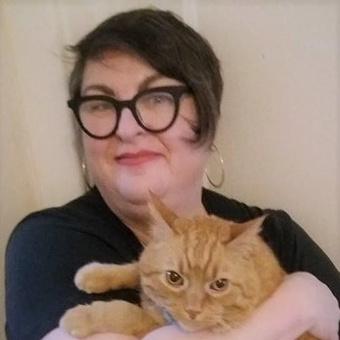
Can you share a specific anecdote/moment from your experience with guest speakers?
The trip to the Newberry Library was especially memorable for me There, Lisa Schoblasky, an Instruction and Outreach Librarian, prepared an archival artifact for each of our students to work with and interpret. The artifacts could not have been more perfectly chosen There were newsletters in Spanish written by the Young Lords in 1960s Chicago, a letter written by Ida B Wells, documents from a Pullman Porter’s personnel file, and more!
How can the research methods covered in the seminar be translated into real-world scenarios, and what impact can they have beyond academic settings?
The work of the humanities and social sciences is the work of interpretation and analysis. The ability to interpret words, ideas, and actions is an absolutely indispensable skill in negotiating the complexities of contemporary life The specific work of the SURF seminar was to uncover, to center, and then to analyze the words, ideas and actions of marginalized people and groups This kind of research requires not just attentiveness, but an intentionally cultivated critical position And an intentionally cultivated critical position is not something you can simply discard when your research project ends; it is something you carry with you into your daily life
In what ways can the Humanities contribute to addressing societal challenges and fostering a greater understanding of human experiences beyond the academic realm?
The humanities central task is analysis and interpretation. Understanding contemporary society, just like understanding anything else, requires effective strategies and methods of analysis In short, if you cannot comprehend what is going on in your own society, you cannot take effective steps to maintain it or to change it.
28
STRC 2023
UNDERGRADUATE RESEARCH FELLOWSHIP CO-INSTRUCTORS
DR. ASHLEY STONE
2023 STRC UNDERGRADUATE RESEARCH FELLOWSHIP CO-INSTRUCTOR
Dr Ashley Stone (she/her/hers) is the 2022-2023 Ida B Wells-Barnett Postdoctoral Teaching Fellow in the Department of African and Black Diaspora Studies at DePaul University. Dr. Stone’s research and teaching areas include race, gender, sociological theory, and higher education Her current research project examines the reproduction of knowledge by exploring the factors that contribute to the inclusion and exclusion of the scholarship of classical Black women social theorists in graduate-level sociology curricula.
The STRC Undergraduate Research Fellowship (SURF) course was – in a word – incredible! I attribute the dynamism of the course to two factors. First, the students who were selected for the course created a strong foundation for an enriching experience. Bringing knowledge from an array of disciplines - including Black Studies, History, and Philosophy - the students were determined to strengthen their understanding of how to conduct research They began the course with novel research topics and an eagerness to answer their research questions scientifically. As co-instructors, Dr. Lisa Poirier and I observed from the beginning their desire to engage in professional development, which, paired with the curriculum, drove the course
Second, the guest speakers who were invited to the course hold an abundant passion for the humanities Dr Carolyn Hopp (University of Central Florida) and Teresa Moreno (University of Illinois at Chicago) not only affirmed the SURF students as emerging scholars but also provided unique insights on how to approach research. During our time with Teresa Moreno, one student asked for clarity on developing a literature review. Teresa’s response resonated with us all: “When you are writing your literature review, ask yourself ‘Who is invited to the party?’ ‘What do they have to say?’

How is what they have to say relevant to your topic?’”. Teresa expertly shifted how the students thought about literature reviews For the remainder of the course, students discussed the joy of working on the “guest lists” for their “parties” By approaching research on their topics in this way, the students were able to identify the gaps in the extant literature, thus, allowing them to identify the gap that their research fills.
As an educator, the SURF course was a unique experience Over the summer and fall quarters, the students learned about an array of humanities research methods while simultaneously developing their research projects. Owning to the course, the students identified the practical applicability of their research to societal issues such as medical racism and cultural practices in community-based organizations As they advanced their research from ideas to completion, I witnessed firsthand the vast potential of today’s emerging scholars who will both impact the academy and make positive changes in society
29
SUMMER
STRC
INSTITUTE FOR NEW STUDENTS
SHAFEEQA AIMAN SYEDA 2023 SUMMER INSTITUTE DAYTIME PEER LEADER
STRC Summer Institute: A Journey of Unity, Growth, and Transformation
My time as a Daytime Peer Leader at the STRC Summer Institute was nothing short of transformative To stand alongside such a diverse and brilliant cohort of students from various backgrounds and disciplines was an eyeopening experience Witnessing the richness of perspectives and experiences that unfolded before us underscored the profound power of unity in diversity Together, we fostered a vibrant learning environment where every individual felt valued, heard, and empowered to contribute their unique voice
The unwavering support and guidance from the dedicated STRC staff played a pivotal role in shaping our journey
Their commitment to creating a nurturing and empowering space served as a constant source of inspiration, motivating us to emulate their example and ensure every participant felt supported and equipped to thrive
Through meaningful interactions with the students, I gained invaluable insights into their unique journeys and struggles Their stories of resilience and perseverance in the face of adversity served as a powerful testament to the transformative potential of humanities
The STRC experience broadened my understanding of the importance of unity amidst diversity and solidified my commitment to advocating for equity and justice It illuminated the profound power of shared stories, art, music, and cultural practices in building resilience and fostering a sense of community, especially in the face of challenges and injustices
I am deeply grateful for the opportunity to have been part of such a transformative and empowering community The lessons learned, the connections forged, and the inspiration ignited will undoubtedly stay with me long after the Institute's conclusion As I look ahead, I am filled with excitement and eager to continue the work of promoting healing and transformation through the humanities, both within the STRC community and beyond

31
GRECIA GABRIELA GARCÍA CAMACHO
2023 SUMMER INSTITUTE OVERNIGHT PEER LEADER

As I write this reflection, I look back to the motivation letter I wrote to be hired for the role of Overnight Peer Leader I remember I was so scared yet so excited and really looking forward to the opportunity I knew it would be something that would make me grow immensely, not only as a professional but as a person However, it scared me a lot because what if students had deep concerns and I could not help them? What if my nationality pulled them away because I couldn’t relate to the experience of growing up in the US? Even if I was scared, I decided to apply for the role and it has still been paying off in more ways than I can tell!
Connecting with people at the Summer Institute shed light on my life It made me realize that this is the work I want to do as a professional! I care about education and all the wholesome ways in which we enrich and truly nurture ourselves and others, and it made me realize that you can be an agent of social change no matter where you are located in the world or where you come from
Having a week to have fun in Chicago, enjoying the summer, learning about myself while caring for others C’mon! My favorite part was simply everything!
32
When I was part of the Summer Institute 2022 cohort as a student, I learned a lot about Chicago Even though I was born and raised in Chicago, I didn't realize how much actually goes on in the city, far beyond what I thought I knew before To this day, I still find Chicago a great city despite its flaws However, because of that course, I also see it being used as a classroom
When I had the opportunity to be a mentor for the Summer Institute 2023 cohort, I was ecstatic to talk about my experience from the previous year as well as get a small glimpse of the topics and discussions the new cohort would be learning My favorite part will deep down always be the boat tour since I remember it being a great experience when I was a student However, something I enjoyed this year that was different from last year was the Gerber/Hart Library I thought it was so cool going into an LGBTQIA+ library where they have queer books, both banned and unbanned, in Chicago It was also really cool having the opportunity to go and see their historical archive and admiring the number of boxes upon boxes of historical documents and information that I didn't even know existed, let alone were kept safe in a library Besides learning about that hidden gem in Chicago, I also learned how much I enjoyed being a mentor, and I decided to become a mentor for freshmen and transfer students this school year Being able to share my experience and teaching all the tips and tricks I wish I knew sooner makes me feel happy
Thank you STRC for giving me such an amazing opportunity and experience I will never forget

JESS CORREA 2022 SUMMER INSTITUTE ALUM 2023 SUMMER INSTITUTE PEER MENTOR 33


The summer before my Freshman year at DePaul, I was invited to attend STRC’s first-ever weeklong Summer Institute For me, this experience was the perfect introduction to DePaul University The perfect introduction to hope, hope that a better Chicago is possible I can’t even begin to describe the benefits of this program without turning this blurb into a full essay!
One lesson we were taught in particular completely changed my outlook on the importance of art in social justice We were taught the extremities of gentrification and explored the concept of cultural preservation through communal murals in Pilsen A beautiful, yet important, lesson on community resilience So naturally, after my phenomenal experience ended, I wanted to be involved with the program on a deeper level I wanted to be a peer mentor for STRC’s next group of incoming students And to my surprise, I was graciously accepted!
Seeing the new faces of STRC experience the hope and warmth that this program provides was the greatest honor of my college career My favorite part of being a peer mentor was meeting all the students and hearing their stories Through them, I learned that STRC is more than just a summer program STRC is a community of students stemming from all sorts of cultural backgrounds, working together to break through boundaries imposed on them And although my experience as a student participant was fulfilling, holding room for students to experience said fulfillment on their own was that much more enriching
VINCENT RINELLA 2022 SUMMER INSTITUTE ALUM 2023 SUMMER INSTITUTE PEER MENTOR
34
STRC EVENT RECAPS

40TH ANNIVERSARY OF HAROLD WASHINGTON’S ELECTION
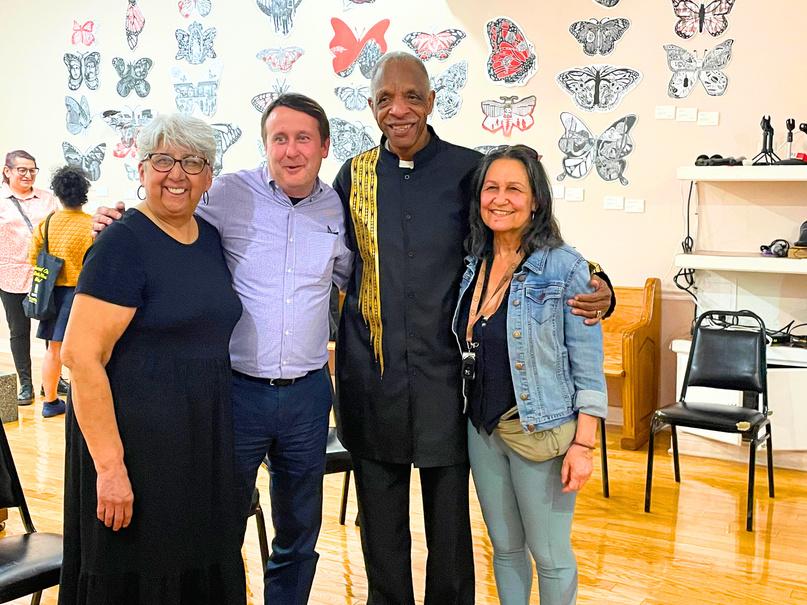
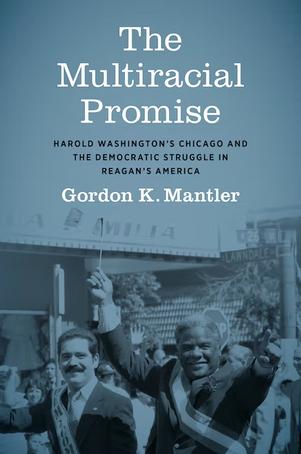
Last year on April 13th and 14th, Dr. Gordon Mantler, Associate Professor of Writing and of History at George Washington University, gave two lectures about his most recent book, The Multiracial Promise: Harold Washington's Chicago and the Democratic Struggle in Reagan's America (Univ of North Carolina Press, 2023) at DePaul University and at Casa Michoacán, located in the Pilsen neighborhood of Chicago
Drawing on a rich array of archives and oral history interviews, Mantler offers a bold reexamination of the movement that elected Harold Washington mayor in 1983. Mantler argues that the election bolstered hope among Democrats that the party could win elections by pulling together multiracial urban voters around progressive causes However, Mantler also discusses how white supremacy, deindustrialization, dysfunction, and voters' own contradictory expectations stubbornly impeded many of Washington's proposed reforms.
36

ICE CREAM SOCIAL
In October of 2023, in celebration of STRC’s 2023 Symposium, we had a small gathering for our ‘22 and ‘23 Summer Institute students, grad and undergrad student fellows, and faculty fellows with delicious popsicles from Pretty Cool Ice Cream!
DIA DE LOS MUERTOS
Dr. Delia Cosentino, Interim Steering Committee Member, and Dr. Juan Mora Torres, 2022 Summer Institute Co-Lead and 2023-2024 STRC Faculty Research Fellow, collaborated on a bulletin published by the Center for Latino Research commemorating Dia de los muertos. They shared informative and anecdotal pieces about the celebration and offered resources such as events, music, and books to learn more!


37
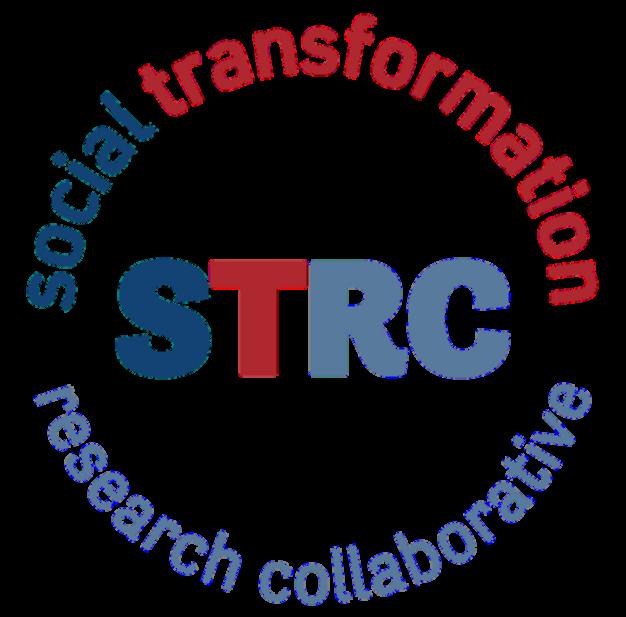
STRC SYMPOSIUM 2023
THE RIGHT TO STORY: RACE, GENDER, AND SEXUALITY IN AN AGE OF BANNED BOOKS
On October 19, 2023, the STRC hosted its second annual symposium, “The Right to Story: Race, Gender, and Sexuality in an Age of Banned Books.” Our keynote speaker, Dr. Roderick Ferguson (Yale University), kicked off the day by delivering a gripping and insightful presentation, titled “‘Enter Thou into this Company’: The Imperiled Mysteries of Critical Literacies.”
Our cohort of inaugural faculty fellows shared what the STRC fellowships allowed them to accomplish Dr Susana Martínez (MOL, PAX) spoke about her project, “Coming of Age(ncy) on the Migrant Trail: Central American and Mexican Adolescent Journeys in Contemporary Young Adult Literature”, and Dr. Chernoh Sesay, Jr. (REL, ABD), talked about his research project, titled “Black Boston and the Making of AfricanAmerican Freemasonry: Leadership, Religion, and Fraternalism in Early America” Both Dr Martínez and Dr Sesay received the STRC’s yearlong research fellowship and have, as a result, neared completion of their book manuscripts
Dr Lourdes Torres (LST, CES) received a Professional Development fellowship for the 2022-2023 academic year, and she spoke about her project, titled “Toward a History of LLEGÓ” through which she engaged in archival research to document the history and significance of the first national LGBT organization for Latino/as, the National Latino/a Lesbian, Gay, Bisexual & Transgender Organization Due to unforeseen circumstances, Dr Lori Pierce (ABD) was unable to join us at the symposium However, on February 1, 2024, Dr. Pierce shared her fellowship work, “DNA Forensics and Genealogy,” at the Center for Latino Research’s Tertulia alongside the 2022-2023 CLR Faculty Fellows. Dr. Pierce's Professional Development fellowship allowed her to delve into the topic of genealogy in the age of DNA test kits and learn what this new trend means for issues of race and ethnicity with the purpose of expanding her courses, which cover topics like race, racism, and identity

We were incredibly excited to also hear from our first cohort of undergraduate research fellows, who delivered poster presentations to attendees during the lunch hour The students and their projects were:
Gabriela Córdova, “Calladita no te ves más bonita: Cultural Practices within Latina Women’s Advocacy”
Jael Davis, “She Was There Too: Enslaved Black Women, Community, and Agency”
Laszlo Katona, “Writing the Wake: Archives, Absence, and Aesthetics in Black Counter-Historical Thought”
Krystal Morgan, “A Qualitative Analysis of the US Public Health Service Syphilis Study and Contemporary Issues of Iatrophobia in Black Women”
Lila Nambo, “The Bracero Program’s Legacy on Its Participants”
Samara Smith, “Disrupting the Gender Script: How Beyoncé’s Lemonade Reimagines a Black Queer Feminine”
39
Dr Ferguson, the Keynote Speaker at the 2023 STRC Symposium
After lunch, our second cohort of graduate research fellows shared their own projects. Laura Carvajal (CES) spoke about her project, “Escaping Anti-Haitinismo: What it means to be Black in the Dominican Republic,” which delves into the complexities and implications of the experiences of dark-skinned individuals in the Dominican Republic Shannan Moore (CES) presented her project, titled, “Black Digital Spaces: Theorizing Resistance in the Wake of Racist Technology,” “a comparative analysis of the connections between maroon communities created in the Americas and the Black digital community.”
We also heard from four students from our 2023 Summer Institute cohort and two student leaders: Taylor Simon, Nicole Silva, Diamond Burks and Karmen Johnson, and Grecia García Camacho and Shafeeqa Aiman Syeda, respectively They shared what their experiences were like as they learned about the history of marginalized communities in Chicago and visited multiple sites across the city, and spoke about the connections they made during the program
The STRC is deeply grateful to everyone who participated in our symposium - from presenters, to attendees, to organizers, it took every single one of us to make sure this was a successful event and a memorable experience full of support and positive energy
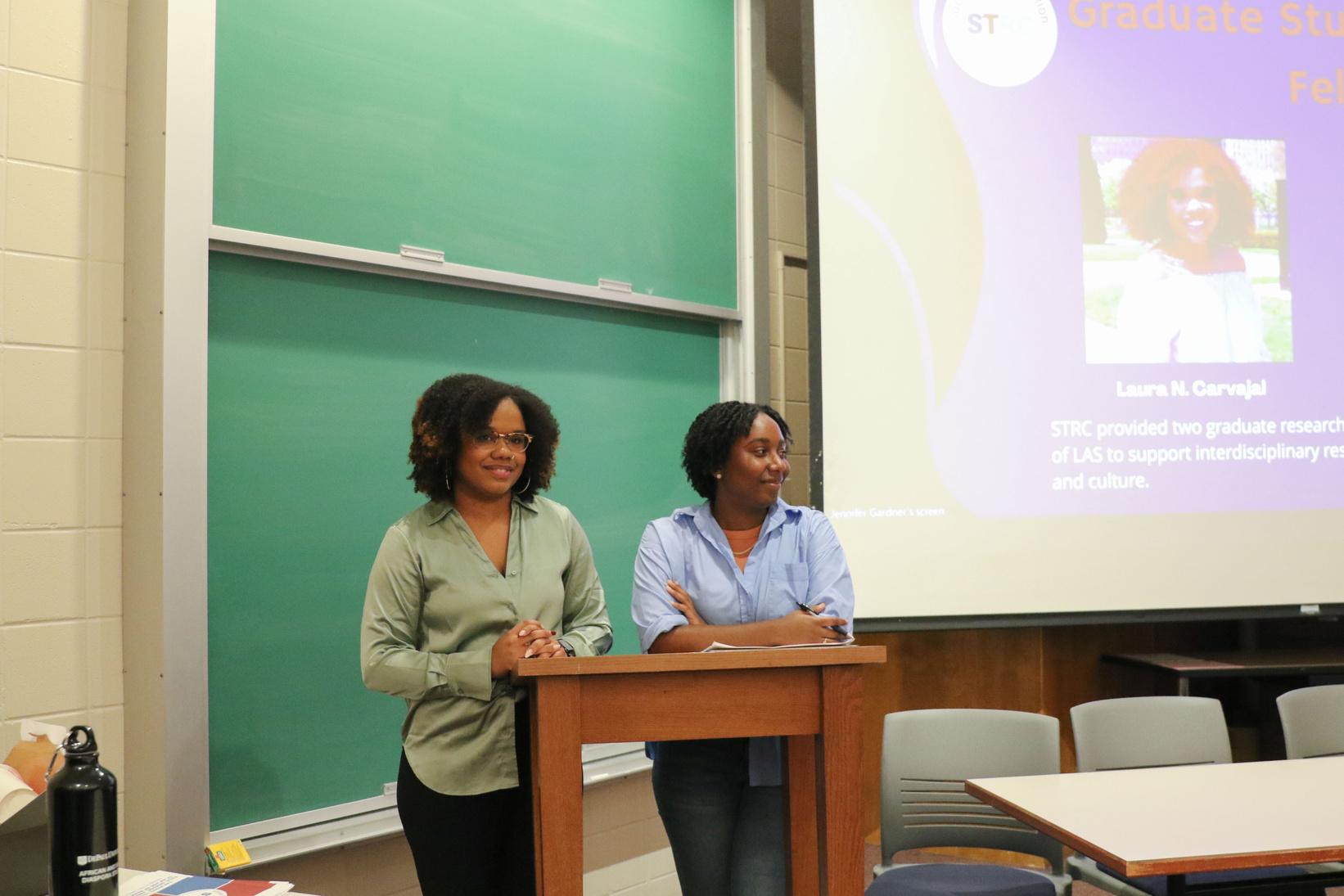
To help us close out what had already been a day full of wonderful and impressive presentations, we were joined by an incredible group of artists and writers Muralist Darius Dennis, photographer Vashon Jordan, Jr, visual artist Diana Solís, and author Maggie Tokuda-Hall shared some of their work and their experiences as artists of color with the audience members Mr Dennis spoke specifically about his work to bring “luxurybrand-level quality” to his large-scale murals of historical figures and events; Mr Jordan talked about his journey documenting the multiple Black Lives Matter protests in Chicago in 2020 and his self-published book, which focuses on the joy and sense of community found at these same demonstrations; Diana Solís shared their work through the decades and spoke of the importance of documenting the work of people on the ground and its influence on younger generations; and last, but certainly not least, author Maggie TokudaHall talked about the barriers she faced during the publication process for her children’s book, Love in the Library, which tells the story of how her grandparents met at a Japanese internment camp during WWII, because of her use of the word “racism.”
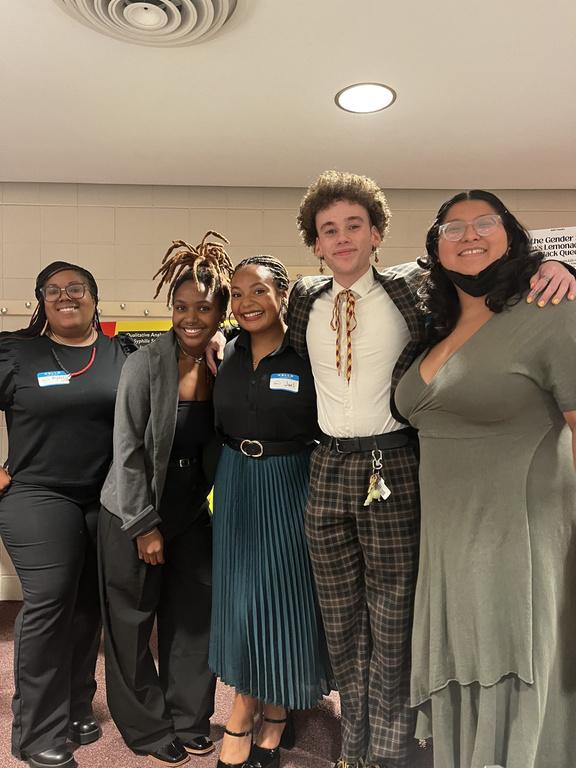
40 2023 STRC Undergraduate Research Fellows after presenting their research projects
CONTACT US:
2320 N Kenmore Ave
Schmitt Academic Center (SAC) 533
go.depaul.edu/strc
Email: strc@depaul.edu
Social Media: @strc_depaul
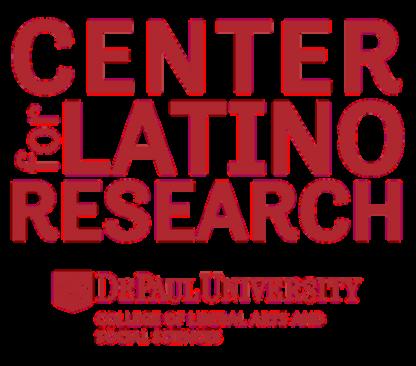
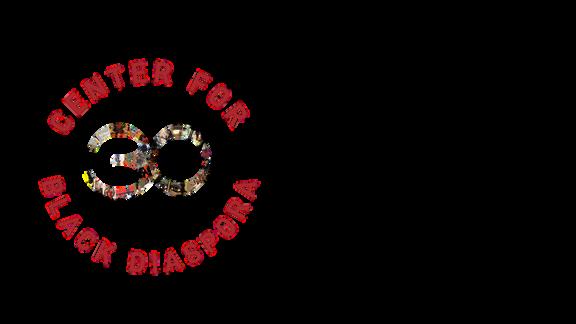

Department of African and Black Diaspora Studies
Department of Latin American and Latino Studies
Global Asian Studies
Critical Ethnic Studies




















































